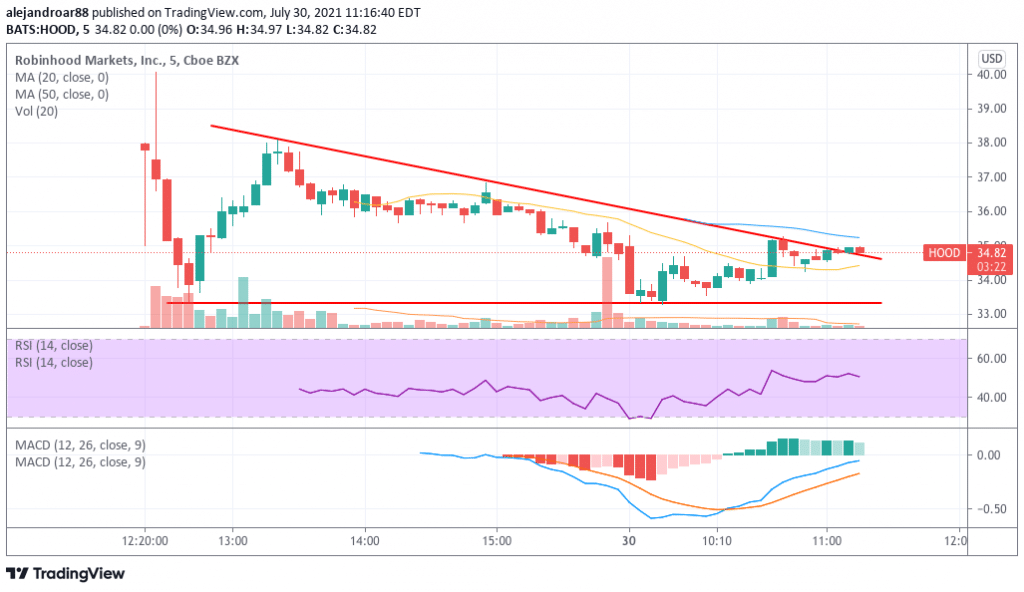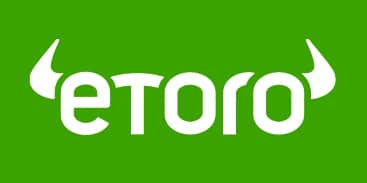Robinhood Closes First Day of Trading with an 8% Loss – What’s Next?
Please note that we are not authorised to provide any investment advice. The content on this page is for information purposes only.
Robinhood closed its first day of trading with an 8% loss in what has been one of the most disappointing initial public offerings of its size since Uber Technologies (UBER) went public back in 2019.
The stock’s intraday price action was quite volatile since the very beginning, with shares posting a 5.9% gain at some point while sliding to a 12.2% loss later on to then settle at $34.82 per share after more than 100 million shares exchanged hands.
Meanwhile, the stock opened this morning’s session with a 4.5% loss but buyers have shown up to lift the price to $34.5, resulting in a much smaller 0.8% slide.
Yesterday, I shared an article that emphasized the possibility that Robinhood’s first day of trading was going to be a fairly volatile one due to the firm’s seemingly stretched valuation compared to that of a peer – in this case, E*Trade.
Now, the question on most of our reader’s minds is probably what is going to happen with the stock moving forward and whether Robinhood might be a good investment at this lower price or not.
In the following article, I’ll share some comments on the latest price action while I’ll also highlight other interesting developments that have occurred after HOOD went public.

Cathie Wood’s fund piles into Robinhood
One notable development that is worth noting is that one of Cathie Wood’s ARK Investment Management funds has scooped $126.16 million in Robinhood shares since the company’s debut on the stock market at an average price of $35 per share.
It appears that the prominent investor used her Ark Innovation Fund (ARKK) as the vehicle to make these purchases, with the stock now accounting for 0.55% of the fund’s total assets.
This move is not atypical for a fund that focuses primarily on innovative companies that are actively disrupting their respective industries – a category on which Robinhood unequivocally falls as it has revolutionized retail trading for better or for worst.
Robinhood’s CEO commented on the future of the business hours before the IPO
During an interview with CNN only hours before the company officially went public, the Chief Executive of Robinhood, Vlad Tenev, shared multiple comments on the company’s future and why investors should consider buying the stock despite its latest controversies.
In this regard, the top executive of the brokerage firm emphasized that Robinhood will be focused on delivering long-term growth rather than following the short-term price swings that its stock will experience while he declined to comment on an ongoing investigation about its employee’s involvement and activities during the latest meme-stock trading frenzy.
As per the firm’s reliance on payment for order flow as its most important revenue item, Tenev commented that even though that might be the case at the moment, Robinhood continues to work to diversify its revenue streams by strengthening other segments including its subscription service Robinhood Gold and its cryptocurrency offering.
Comments in social media emphasize a potentially ongoing PR crisis for HOOD
Part of the lackluster performance of Robinhood’s IPO might be attributed to a disappointed customer base that was offended by the actions taken by the company during the early 2021 meme-stock craze, as the firm temporarily halted the trading of multiple retail favorites including GameStop (GME) and AMC Entertainment (AMC).
The most outraged customers emphasized that while they experienced limitations in their ability to trade, sophisticated market participants like hedge funds were able to continue making trades during a controversial short-squeeze that caused billions of dollars in losses to prominent institutional investors like Melvin Capital.
In response to these actions, thousands of users flocked to the Apple App Store to leave their negative feedback for the trading platform and a similar situation happened on Android’s Google Play Store.
Meanwhile, only hours before the initial public offering took place, hundreds of negative comments circulated in social media about the company’s services including one coming from the founder of Barstool Sports, a familiar and widely-followed character for retail traders, Dave Portnoy, who stated that Robinhood had “screwed all their clients” while stating that he was profoundly “disillusioned” by the company’s actions.
Robinhood’s next quarterly reports should ultimately reflect if this silent PR crisis may continue to gain traction to a point that it affects the firm’s future growth or if this would be just a temporary fluke that will be eventually forgotten by both customers and investors as they continue to enjoy some of the firm’s appealing futures – many of which are not offered by other providers in the industry yet.






